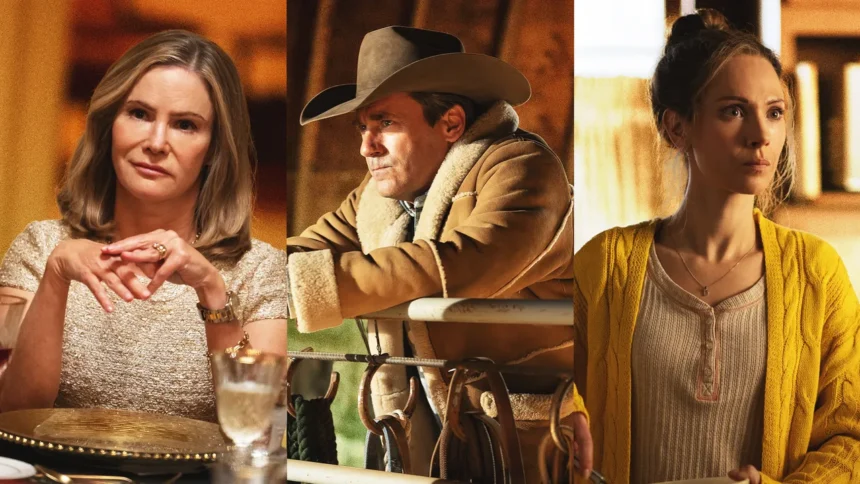Dot is losing the trust of her family (even the ones she is clumsily attempting to protect) as a result of her obsessive focus on turning her home into an impenetrable fortress. Lars, Indira’s spouse, appears to be very happy to let his credit card debt accumulate as he practices his golf swing. Roy views himself as practically above the law and untouchable. He treats the FBI agents who visited him in the last episode with something worse than contempt—playful indifference. Though it would be a stretch to argue that these people have been overindulged for too long, the message of season five’s increasing emphasis on debt seems to be very clear: The bill is coming. The question of how much is more important than who will pay.
Gator and Roy Tillman’s dilemma with Ole Munch—whose first name is pronounced “Ulah,” as we find out tonight—seems to have the easiest solution at first. He was defrauded of his payment for Dot’s attempted kidnapping (along with pain and suffering), and it’s difficult to read the “YOU OWE ME” note that was stuffed into one of Roy’s entourage members. However, given that his creditors attempted to have him killed, Ole’s concept of an outstanding obligation might have simply developed from an envelope of cash. Perhaps, though, he is motivated by something quite different (more on that later). Roy gives Gator the most astute advice of the day when he says, “High noon only happens in the movies, son.” “I think you should go to sleep with your hammer cocked.” This year’s big stars are undoubtedly Jon Hamm and Juno Temple, but Joe Keery turns in a fantastic performance this week, shifting between a convincingly evil villain and a hangdog doofus, depending on the viewer. He later acts cool and collected, even threatening Whitt with a particularly nasty “your mom” joke before walking off after grabbing Donny’s (the poor sap who had his head crushed by Dot in the first episode) wallet from the evidence box in front of Whitt.
Living her two lives is becoming more difficult for Dorothy, who tells a desperate Wayne that she and Scotty are going to be zombie hunters for Halloween—complete with real bulletproof jackets. While out trick-or-treating, she and her daughter make do with the baseball bats that are reinforced with nails because they were unsuccessful in purchasing three weapons for the house due to a federally mandated one-week waiting period. Wayne, on the other hand, is reduced to little more than a “zombie,” lacking any kind of armor or weaponry. Whatever you want to make of it.
Roy seemed to have an extremely peaceful home life in contrast to the Lyons. Following a brief meeting with Odin, the militia commander Roy pilfers supplies for, he tends to his twin daughters and, once again, his very young wife, Karen (Rebecca Liddiard). She asks, “What’ll it be tonight?” as he lies in bed with his nipple rings blatantly visible. “A helpless passenger? Or an enraged feminist [brandishing handcuffs]? Roy, on the other hand, seemed to be in a kind of trance. smoking, looking straight up, and pushing Karen away with physical provocation when she gets into bed A picture of Dot having supper with her family comes on the ceiling while he smokes and focuses. He growls, “I see you,” as the dot turns to face him in his fleeting vision.
From the beginning of its second season, Fargo has never been afraid to dabble with the fantastical and paranormal. But the rituals on exhibit in this episode may be the most cryptically fascinating in the series—even in a show where a flying saucer once made an appearance. An old woman arrives at her house halfway through the episode on a frigid street in North Dakota, places multiple six-packs of beer on her kitchen counter, and sits to watch tennis. The floors above her start to creak all of a sudden, so she investigates and finds Ole, who uses a rocking chair gently before turning to face her and declaring, “I live here now.”
With a burst of music, “500 YEARS EARLIER” abruptly comes on screen, taking us to late medieval Wales. There, a man who strikingly resembles Munch—yes, Sam Spruell—works as a sin-eater at a lord’s funeral. Sin-eating was a custom in which peasants would eat a meal thought to have absorbed the sins of the recently deceased, giving them safe passage to heaven, in exchange for the forgiveness of debts (or even a modest profit). It’s safe to say that Ole Munch is acting from a completely different playbook than everyone else on this program, and I’ll be damned if I try to understand all that. Is he returning to life? Is he over 600 years old? Is this merely a thematic point to remember? all appear plausible at once. While Noah Hawley has populated Fargo in the past with antagonists who resemble natural forces rather than human beings, Spruell’s portrayal of Munch already feels like an otherworldly step above. He is the embodiment of sin, prepared to strike whoever he directs next.
Back in the real world, Danish Graves is letting his client be anything but forthcoming, and Deputy Olmstead is once again being stonewalled by the Lyons—this time in Lorraine’s office. The officer in charge of Indira appears to be aware of the direction the wind is blowing and chirpily accepts that the Lyons will not be speaking. After a short and ineffective meeting, Lorraine pokes fun at them, as we have already established her habit. “What role do you play?” She shoots a lazy jab at Indira. “You serve as a tool to distinguish between people who possess wealth, social standing, and intelligence.” As gatekeepers, you stay outside the gates and prevent the rabble from entering. But you are useless inside these walls. Before Indira can reply, her employer grasps her shoulder and absorbs this. Say no more.
Although the third episode doesn’t advance the plot particularly, the way it fits the parts for the inevitable fallout next week is both fascinating and horrifying. Munch kills a goat on Tillman’s property, covering himself in mud, blood, and self-inflicted wounds as he prays (chants?) in Latin, ghostly runes dancing on the walls around him. This is the closest the series has ever gone to overt horror. Roy lights a candle, sits by himself among the pews in the little church on his complex, and waits for word about the second effort to apprehend Dot, who he knows as “Nadine.” To uphold the absurd façade of a typical existence, Dot spends the evening watching her family when they go sweets collecting. Fargo appears to be posing the following question in an episode full of blood magic, sin-eating, and peeks behind the curtain: What are superstition, ignorance, and denial if not updated versions of antiquated customs meant to give us the appearance of control over forces outside the realm of death?
Random thoughts
Let’s add Odin’s whiskey consumption (“can’t be too careful”) and the appearance of a second individual sporting an eyepatch as items to watch out for, in addition to Chekhov’s sledgehammer in the Lyon family.
The ancient peasant of Spruell recites, “For thy peace, I pawn my soul,” before receiving two little coins. Folks, the gig economy predates Uber by a long shot!
When she finds Ole upstairs, the woman whose house is now Ole’s heads for the phone, but then changes her mind. He later says to her, “Mama, I’m going out.” I guess that’s sufficient gratitude? Even so, eerie?
Aside from the fact that Dorothy was formerly a member of Tillman’s shady cult, little is known about her history. Did she acquire her survivalist skills before or after her stay at the compound? In the age of GPS, her act of flipping every street sign in her nearby neighborhood demonstrates her awareness that even a brief moment of perplexity can be turned into a useful time for her in the event of the inevitable.
It appears that Noah Hawley is a huge admirer of Henry Selick and is taking part in the celebrations for the film’s 30th anniversary, what with the “This Is Halloween” needle drop last week and Gator’s kidnapping crew all dressing up this week in costumes approved for The Nightmare Before Christmas. If I were slightly more pessimistic, I would point out that Fargo and it both belong to the same parent firm.









